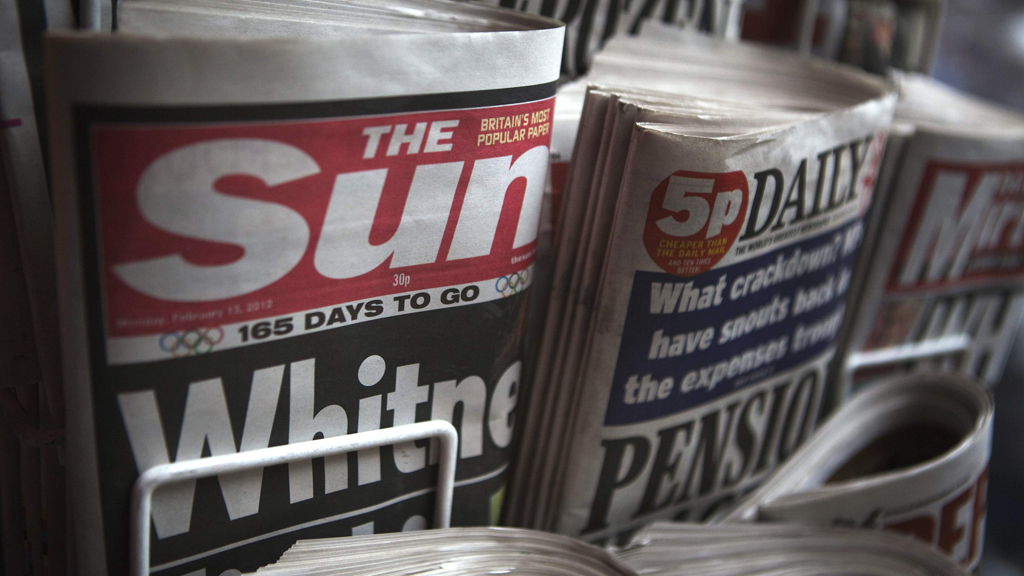Leveson inquiry: the key questions
Is it just us or is there a lot of chat about newspapers today? From Milly Dowler’s voicemail to David Cameron’s “lol” texts: Channel 4 News answers the who, why and what of the Leveson inquiry.

Why is there an inquiry?
The revelation last year that missing schoolgirl Milly Dowler‘s phone had been illegally hacked by journalists at the News of the World, which followed a string of allegations of illegal intrusion into privacy by the paper, highlighted the extent of phone hacking at the Sunday tabloid – and the possibility of it happening at other papers – and led David Cameron to set up an inquiry into the culture, practices and ethics of the press as a whole.
Who is involved?
Those accused of phone hacking, or editors who are accused of giving the practice the thumbs up, were called to give evidence at the inquiry, including Rebekah Brooks [pictured below] former chief executive of News International (publisher of the News of the World and the Sun) who divulged the famous “lol” texts from David Cameron and former Daily Mirror editor Piers Morgan. Even media mogul Rupert Murdoch showed up to be questioned on his social contacts with politicians.
Then there were those who alleged their phones had been hacked and gave evidence as victims of the press. Celebrities including Hugh Grant and Charlotte Church have been some of the most vehement critics of the press for its intrusion into their lives, and back the Hacked Off campaign group calling for some legally-binding regulation of the press.
The only thing we can expect, is that something has to give – it won’t be staying the same. Dr Des Freedman, Media Reform
However it was the testimony from families of crime victims that garnered the most sympathy from the public during the inquiry: the parents of Milly Dowler explained how the hacking of their daughter’s phone made them think she was still alive, while Kate McCann, mother of Madeleine, spoke of her devastation on discovering that her diary was published in the News of the World.
A host of media commentators, analysts, academics and politicians also contributed their thoughts on whether some media corporations (primarily News International) have too much power, the relationship between the press and politicians, and the police.
Read more: Ombudsman could be Leveson solution

How does the inquiry work?
The inquiry, named after Lord Justice Leveson who has been leading proceedings, was established with the aim of exploring the press in relation to the general public, the police and politicians, and was tasked with coming up with recommendations for keeping the press in check. It was set up on the premise that the current regulatory body – the Press Complaints Commission (PCC) – is not doing a good enough job. It is funded by the Department for Culture, Media and Sport and the Home Office.
There are two parts to Lord Leveson’s inquiries.
The first part is to “inquire into the culture, practices, and ethics of the press”. During around 16 months of investigations, many of which were engaged in public hearings, it has heard from 337 witnesses and received 297 written submissions from a number of interested parties including politicians, journalists, victims of phone-hacking or negative press, and the police.
The second part will inquire into issues including: the extent of unlawful or improper conduct within news organisations and by those responsible for holding personal data; how police forces investigated alleged wrongdoing at news organisations; the extent of corrupt payments to police.
The timing of this part of the inquiry will depend on the progress of several ongoing criminal investigations by the police, namely Operation Weeting, into allegations of phone hacking at the News of the World, Operation Elveden, into allegations of inappropriate payments to police officers by journalists, and Operation Tuleta into allegations of computer hacking.
Get the latest on events as they happen with our live blog below.
What could happen to the press?
The outcomes range from the minimal control of self-regulation, to the heavy handed statutory regulation, (modelled on Ofcom which regulates the broadcast media) – and everything in between.
“We are waiting to see whether he places himself firmly in camp of statutory underpinning, giving the PCC plan another go, or whether he comes up with a new solution. The only thing we can expect, is that something has to give – it won’t be staying the same,” Dr Des Freedman from the pro-reform campaigning group Media Reform, told Channel 4 News.
It is worth pointing out that Lord Leveson is putting forward recommendations, and it is up to the government to choose how it takes these forward. “It is just possible that he will displace some of the decision-making again,” adds Dr Freedman.
Who is in favour of which outcomes?
Most newspapers are in favour of either self-regulation or independent regulation by strengthening the current Press Complaints Commission and making it more independent from the press – but crucially, without legislation being required. One further step involves judicial oversight, which would be supported by a legal panel (and is backed by The Times newspaper).
But the Hacked Off campaign, led by Hugh Grant, plus the National Union of Journalists (NUJ) want to see a “statutory underpinning” option, with an independent ombudsman, that could be similar to the current Irish model. They believe that only when an independent regulatory body has the backing of the law, that the press will really be reined in.
Then there is the broadcast media model, where an official regulator (similar to Ofcom) has the power to remove a broadcaster’s licence if they breach the rules. But few people want this to apply to the press, believing it would encroach on the freedom to publish and hold the powerful to account.
Politicians have been split on the issue, but as the publication date of Lord Leveson’s findings approached, the calls for cross-party consensus from political leaders have become louder.
